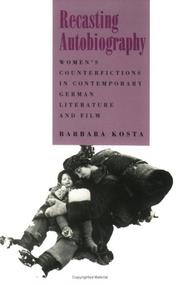Check nearby libraries
Buy this book

"How did we become the way we are?" The question that haunts Christa Wolf's autobiographical work Patterns of Childhood has prompted many other writers and filmmakers to examine their identities as postwar German women.
In one of the first books to address the New German Cinema from a feminist perspective, Barbara Kosta looks closely at two autobiographical films; Helma Sanders-Brahms's Germany, Pale Mother and Jutta Bruckner's Years of Hunger, and at two books, Ruth Rehmann's Der Mann auf der Kanzel: Fragen an einen Vater (The man in the pulpit: Questions for a father,) and Wolf's Patterns of Childhood.
In different ways, Kosta shows, these works of the 1970s and 1980s have recast traditional autobiography, offering fresh characters in new roles exploring innovative forms of expression, and confronting long-repressed themes such as the devaluation of the female voice and the horror of Germany's fascist past.
Kosta perceives in autobiographies by German women a conflict between the need to accept their sociocultural heritage and the desire to uncover and respond to its destructive aspects. As they struggle to redefine relationships among family, history, and self, Wolf and Rehmann write of the psychic structures, that were shaped by a childhood under the Third Reich in their films, Sanders-Brahms and Bruckner, who grew up after the war, explore issues of gender relations as well as re-enacting German history.
For all four, Kosta demonstrates, autobiography is at once a process of remembering and working through national and personal trauma, a task of mourning and healing, and an act of self-invention.
Check nearby libraries
Buy this book

Previews available in: English
Subjects
Autobiography, History and criticism, Women motion picture producers and directors, German prose literature, Women in motion pictures, Women authors, Women and literature, History, Biography, Women, Schriftstellerin, Fiktion, Biographies, Deutschland, bleiche Mutter, Biografischer Film, Autobiografie, Femmes, Hungerjahre - in einem reichen Land, Deutsch, Productrices et realisatrices de cinema, Filmregisseurin, Histoire et critique, Prose allemande, Ecrits de femmes allemands, Ecrits de femmes autobiographiques, Prosa, Femmes au cinema, Autobiography, women authors, Women, germanyPlaces
GermanyTimes
20th centuryShowing 1 featured edition. View all 1 editions?
| Edition | Availability |
|---|---|
|
1
Recasting autobiography: women's counterfictions in contemporary German literature and film
1994, Cornell University Press
in English
0801428890 9780801428890
|
aaaa
Libraries near you:
WorldCat
|
Book Details
Edition Notes
Includes bibliographical references (p. [193]-212) and index.
Classifications
The Physical Object
ID Numbers
Community Reviews (0)
Feedback?History
- Created April 1, 2008
- 14 revisions
Wikipedia citation
×CloseCopy and paste this code into your Wikipedia page. Need help?
| July 25, 2024 | Edited by MARC Bot | import existing book |
| December 22, 2022 | Edited by ImportBot | import existing book |
| November 17, 2020 | Edited by MARC Bot | import existing book |
| October 7, 2020 | Edited by ImportBot | import existing book |
| April 1, 2008 | Created by an anonymous user | Imported from Scriblio MARC record |










